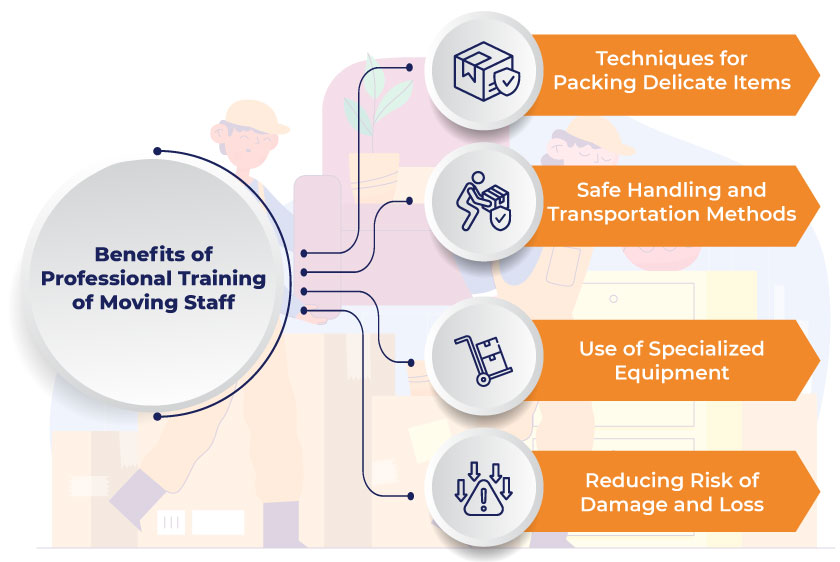Elevating Moving Standards with Professional Training for Special Items

In the relocation industry, the handling of special items such as fine art, antiques, delicate electronics, and other valuables requires more than just physical labor—it demands precision, care, and above all, professional training.
Through this discussion, we aim to highlight why investing in professional training is not just beneficial, but essential for moving companies striving to provide exceptional service and peace of mind to their customers.
What are Special Items?

Some items require a bit more attention and care during the moving process. These are often categorized as "special items," which can be fragile, valuable, oversized, or possess unique characteristics that necessitate special handling. Special items typically include:
- Artwork: From delicate paintings and sculptures to large installations, artwork requires careful handling to prevent any damage to surfaces or structures.
- Antiques: These items are not only valuable but may also be irreplaceable. Their age and rarity often mean they are more susceptible to damage from vibrations, shocks, or environmental changes.
- Musical Instruments: Whether it’s a grand piano, a vintage guitar, or a classical violin, musical instruments require meticulous attention to maintain their sound and integrity.
- Electronics: High-value electronic items like computers, servers, or home theater systems need special handling due to their sensitive components.
Each of these items demands specific packing materials, handling techniques, and transportation conditions to ensure their safe arrival. For moving companies, understanding what qualifies as a special item is the first step in guaranteeing the highest level of service and customer satisfaction.
Benefits of Professional Training of Moving Staff

Professional training equips movers with the essential skills and knowledge needed to handle special items with the utmost care and efficiency. This training is not just about strength; it's about precision and understanding the best practices in packing, handling, and transporting items that require extra attention. Here’s how professional training prepares movers for the challenges of dealing with delicate and valuable items:
1. Techniques for Packing Delicate Items
- Training provides movers with knowledge of various packing materials and techniques suitable for different types of items. For instance, the use of acid-free tissue paper for artworks, customized crating for antiques, and anti-static packaging for electronics.
- Movers learn how to assess the vulnerability of an item and decide the best way to protect it during the move, such as using custom padding or support frames.
2. Safe Handling and Transportation Methods
- Professional training includes learning the proper techniques for lifting, carrying, and loading special items to prevent physical damage.
- Movers are taught how to secure items inside a moving truck to prevent shifts during transport, which can be particularly crucial for long-distance moves.
- Special attention is given to the methods of unloading and setting up items at their new location, ensuring that the process is reversed with the same care and attention.
3. Use of Specialized Equipment
- The training involves the use of specialized equipment such as dollies, hoists, and custom straps, which are essential for safely moving oversized or unusually heavy items.
- Movers also learn how to operate these tools proficiently, ensuring that items are not only moved more efficiently but also more safely.
3. Reducing Risk of Damage and Loss
- Comprehensive training significantly reduces the likelihood of damage and loss of special items during a move. Trained professionals are less likely to make errors in packing and handling, which are common causes of incidents.
- By understanding the proper techniques and applying them during the move, trained movers can almost eliminate the risks associated with moving delicate and valuable items. This not only prevents financial loss but also preserves the reputation of the moving company and increases customer satisfaction.
Common Risks Associated With Improper Packing and Moving

The relocation of special items comes with inherent risks, particularly when proper packing and moving techniques are not employed. Improper handling of these items can result in a range of adverse outcomes, from minor damages to irreparable losses, which can be both financially and emotionally costly.
1. Physical Damage:
- Fragile items such as glassware and ceramics can easily crack or shatter if not properly cushioned and secured.
- Artworks and antiques are susceptible to scratches, tears, and dents when not adequately protected, especially during long transports or bumpy rides.
- Electronic equipment can suffer from internal damages if not properly insulated against shocks and vibrations.
2. Loss of Value:
- Even minor damage can significantly decrease the monetary and collectible value of antiques and artworks.
- Restoring damaged items can be costly, and sometimes items cannot be restored to their original condition, leading to total value loss.
3. Operational Delays:
- Improper handling can lead to longer transit times as items may need to be repacked or secured en route.
- In some cases, damage may require insurance claims to be filed and processed, further delaying the moving process.
Continuous Learning and Adaptation

The relocation industry constantly evolves with new technologies and changing consumer expectations. Staying updated through continuous learning and adaptation is crucial for maintaining high service standards and ensuring competitive edge. Here's a point-wise breakdown on why this is important:
1. Importance of Ongoing Training:
- Keeping Up with Technological Advances: As new packing materials and logistical software emerge, ongoing training helps movers master these innovations, which can significantly enhance the safety and efficiency of moving operations.
- Adapting to New Equipment: Training ensures that staff are proficient in using advanced equipment, which can improve the handling of special items and streamline operations.
2. Staying Updated with Techniques:
- Refining Skills: Regular workshops and hands-on demonstrations allow movers to continuously refine their handling techniques, minimizing the risk of damage to delicate items.
- Learning Industry Standards: Continuous education helps staff stay aligned with the latest industry standards and safety protocols, vital for maintaining service quality.
3. Contributing to Service Excellence:
- Fostering a Culture of Excellence: Ongoing professional development fosters a culture of excellence within the company, leading to enhanced service delivery and increased customer satisfaction.
- Enhancing Team Morale and Stability: Investing in staff development boosts morale and job satisfaction, leading to lower turnover rates and more consistent service quality for clients.
4. Benefits to Business and Client Relations:
- Innovative Solutions: A well-trained team is more likely to implement innovative solutions that meet complex challenges, enhancing overall customer experience.
- Building Client Trust: Demonstrating a commitment to professional growth reassures clients of the company’s expertise and reliability, strengthening client relationships and enhancing the company’s reputation as an industry leader.
Move with Confidence: Why Expert Training Makes All the Difference
Throughout this blog, we have explored the critical importance of professional training in the relocation industry, especially in the handling of special items. We've highlighted how meticulous training in packing techniques, safe handling, and the use of specialized equipment not only enhances the safety and security of fragile, valuable, and unusual items but also significantly reduces the risk of damage and loss during the moving process.
Professional training sets a moving service apart from competitors by ensuring that every team member is equipped with the knowledge and skills necessary to handle even the most challenging relocations. This commitment to excellence in training reflects a moving company's dedication to quality service and customer satisfaction.
We encourage potential clients to recognize the value of specialized skills when selecting a moving service. Choosing a company that invests in professional training means opting for peace of mind, knowing that your valuable and sentimental belongings are in the safest hands.











